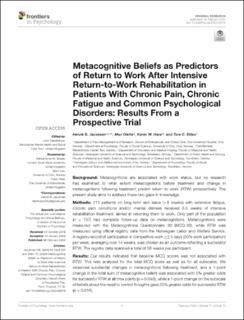| dc.contributor.author | Jacobsen, Henrik Børsting | |
| dc.contributor.author | Glette, Mari | |
| dc.contributor.author | Hara, Karen Walseth | |
| dc.contributor.author | Stiles, Tore C | |
| dc.date.accessioned | 2021-02-18T14:16:03Z | |
| dc.date.available | 2021-02-18T14:16:03Z | |
| dc.date.created | 2021-01-12T11:11:22Z | |
| dc.date.issued | 2020 | |
| dc.identifier.issn | 1664-1078 | |
| dc.identifier.uri | https://hdl.handle.net/11250/2729007 | |
| dc.description.abstract | Background: Metacognitions are associated with work status, but no research has examined to what extent metacognitions before treatment and change in metacognitions following treatment predict return to work (RTW) prospectively. The present study aims to address these two gaps in knowledge.
Methods: 212 patients on long-term sick leave (>8 weeks) with extensive fatigue, chronic pain conditions and/or mental distress received 3.5 weeks of intensive rehabilitation treatment, aimed at returning them to work. Only part of the population (n = 137) had complete follow-up data on metacognitions. Metacognitions were measured with the Metacognitions Questionnaire 30 (MCQ-30), while RTW was measured using official registry data from the Norwegian Labor and Welfare Service. A registry record of participation in competitive work ≥2.5 days (50% work participation) per week, averaging over 14 weeks, was chosen as an outcome reflecting a successful RTW. The registry data spanned a total of 56 weeks per participant.
Results: Our results indicated that baseline MCQ scores was not associated with RTW. This was analyzed for the total MCQ score as well as for all subscales. We observed substantial changes in metacognitions following treatment, and a 1-point change in the total sum of metacognitive beliefs was associated with 5% greater odds for successful RTW at all time points (p = 0.040), while a 1-point change on the subscale of beliefs about the need to control thoughts gave 20% greater odds for successful RTW (p = 0.016).
Conclusion: Metacognitions concerning the need to control thoughts appear to have a significant influence on patients return to work. Here, we observed that a change in these beliefs following treatment substantially affected RTW over the course of 1 year. | en_US |
| dc.language.iso | eng | en_US |
| dc.publisher | Frontiers Media | en_US |
| dc.rights | Navngivelse 4.0 Internasjonal | * |
| dc.rights.uri | http://creativecommons.org/licenses/by/4.0/deed.no | * |
| dc.title | Metacognitive Beliefs as Predictors of Return to Work After Intensive Return-to-Work Rehabilitation in Patients With Chronic Pain, Chronic Fatigue and Common Psychological Disorders: Results From a Prospective Trial | en_US |
| dc.type | Peer reviewed | en_US |
| dc.type | Journal article | en_US |
| dc.description.version | publishedVersion | en_US |
| dc.source.volume | 11 | en_US |
| dc.source.journal | Frontiers in Psychology | en_US |
| dc.identifier.doi | 10.3389/fpsyg.2020.00070 | |
| dc.identifier.cristin | 1869709 | |
| dc.description.localcode | Copyright © 2020 Jacobsen, Glette, Hara and Stiles. This is an open-access article distributed under the terms of the Creative Commons Attribution License (CC BY). The use, distribution or reproduction in other forums is permitted, provided the original author(s) and the copyright owner(s) are credited and that the original publication in this journal is cited, in accordance with accepted academic practice. No use, distribution or reproduction is permitted which does not comply with these terms. | en_US |
| cristin.ispublished | true | |
| cristin.fulltext | original | |
| cristin.qualitycode | 2 | |

